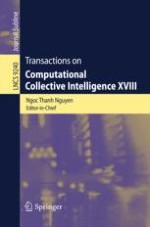2015 | OriginalPaper | Chapter
Performance Evaluation of the Customer Relationship Management Agent’s in a Cognitive Integrated Management Support System
Author : Marcin Hernes
Published in: Transactions on Computational Collective Intelligence XVIII
Publisher: Springer Berlin Heidelberg
Activate our intelligent search to find suitable subject content or patents.
Select sections of text to find matching patents with Artificial Intelligence. powered by
Select sections of text to find additional relevant content using AI-assisted search. powered by
